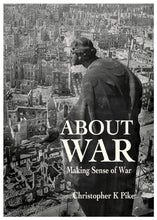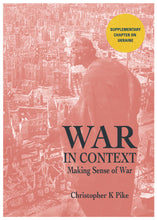War has been a constant of human history. From the fortified settlements of the Neolithic to the trenches of the Somme, from the Cold War nuclear standoff to the Russian invasion of Ukraine, organised violence has shaped the destinies of peoples, nations, and empires. Yet despite its persistence, war remains one of the least understood of human activities. Too often it is confused with warfare, reduced to the mechanics of battles and technology, rather than recognised as a political act with profound consequences.
The Making Sense of War trilogy by Christopher K. Pike confronts this gap directly. It offers a sustained, multidisciplinary study of war’s causes, conduct, and consequences, drawing on history, politics, strategy, sociology, psychology, and international relations. Across three volumes — About War, War in Context, and War after Ukraine — the trilogy provides readers with an accessible yet rigorous framework for understanding why wars begin, how they are fought, and why they so rarely end as their initiators intend.
War after Ukraine, the trilogy’s conclusion, brings the analysis into the twenty-first century. Beginning with Russia’s invasion of Ukraine in 2022, Pike examines how European security has been reshaped, how NATO’s role has been tested, and how nuclear strategy remains contested. Beyond Ukraine, the book explores the resilience of the nation-state, the fragility of international institutions, and the prospects for peace in an age of renewed great-power rivalry. It closes by advancing seven perspectives on war, distilled from the trilogy as a whole, and insists on the neglected trinity of Victory, Peace, and Justice as the only basis for durable settlements.
Some reader’s comments:
“War after Ukraine is the gripping conclusion to the Making Sense of War trilogy, building on the insights of its predecessors”
“Pike offers a thorough analysis of Russia’s historical use of force, particularly in the context of the Ukraine war, while challenging popular narratives that portray Western actions as provocations for Putin’s aggression”
“The book highlights the urgent need for European unity in the face of Russian threats and critiques the limitations of current Western interventions”
“War after Ukraine delves into the complexities of state and national identities, which are crucial for understanding modern international relations”
“Pike also addresses the outdated nature of Cold War-era nuclear strategies, advocating for a reassessment in light of new geopolitical realities
"War After Ukraine" is an essential read for those seeking a deeper understanding of contemporary conflicts and the future landscape of global politics.
Author Profile
Christopher K Pike is an authority on war and warfare, and has been studying military history for 50 years. He believes that victory in battle is not the key to a lasting peace. What matters is understanding war’s constraints, defining aims and knowing when goals have been achieved. Organised violence, so often futile, is a last resort. Napoleon and Hitler are two examples of men failing to grasp war’s risks, war’s fallibilities, and their own limitations.
Pike’s is an alumnus of the Department of War Studies, King’s College, London, where his focus was on war and politics.
He also holds degrees in Mechanical Engineering and Business Administration. He was elected to the Council of the Society for Army Historical Research, where he organised and delivered lectures, including a major seminar at Apsley House, London, on Waterloo and the Iron Duke.
He lives in London and Norfolk and is a frequent visitor to the battlefields of Europe, seeing the ‘Other Side of the Hill’ for himself. He has written many penetrating strategic backgrounds for battlefield tour guides.
For an overview of the trilogy and details of each volume, refer to Christopher K Pike’s website: https://makingsenseofwar.com






